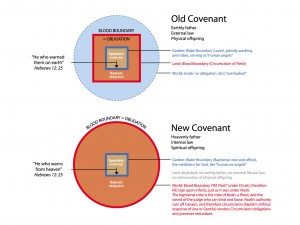School of the Prophets
or The Spirit of Prophecy – 2

Baptism is not a Covenant boundary but a staff uniform.
“I have kept for myself seven thousand men who have not bowed the knee to Baal.” (Romans 11:4)
There is much talk today about the dichotomy between the visible Church (those who physically participate) and the invisible Church (those who are truly regenerate). The dichotomy exists because it often seems, as it was in the first century, that “not all Israel is Israel.” But the Bible never makes this distinction.
Not all of those who participated in the flesh truly participated, or fellowshiped, in the Spirit. It was possible for Paul to speak of two classes of Israelites, the Jew and the “true Jew,” because the Jew-Gentile distinction still existed. It was possible to be circumcised in the flesh but not in the heart. It is certainly possible to be baptised in the flesh but not in the heart, but is this really the same problem? Is not the very definition of a Christian, a member of Christ, one who is circumcised in heart, a true Jew?
So, the only way for this to occur today is to either maintain that the one who claimed to be a Christian was mistaken or lying, or that there are two kinds of Christian, and unregenerate Church members can still have some kind of Covenantal “union with Christ” as all Jews were linked with Abraham. The question is this: Does the Bible have anything to say about this visible/invisible dichotomy that helps us without turning the Church into a new kind of Circumcision (God forbid)? Yes. There is a third way.
Men and Women
Paedobaptists insist that there is still come kind of social “Covenant people,” with the rite of baptism as the boundary of this “visible” assembly. They see their offspring as “Covenant children,” even though the New Testament never speaks this way. Certainly, the Church is a new kind of Israel, a holy people, a royal priesthood, but clearly this refers to the same kind of “true Judaism” explained in Romans by Paul. An uncircumcised heart makes outward circumcision — and thus outward baptism — meaningless. Since the Law is fulfilled, and the Jew-Gentile distinction finished, infant baptism is thus always already meaningless. Birth identity is now entirely irrelevant.
So how are we to understand an “Israel” that is made up only of believing “men and women.” Paedobaptists love to mention the household baptisms in the book of Acts, but conveniently neglect to mention the numerous instances where the phrase “men and women” appears.
And more than ever believers were added to the Lord, multitudes of both men and women… (Acts 5:14)
But Saul was ravaging the church, and entering house after house, he dragged off men and women and committed them to prison. (Acts 8:3)
But when they believed Philip as he preached good news about the kingdom of God and the name of Jesus Christ, they were baptized, both men and women. (Acts 8:12)
Many of them therefore believed, with not a few Greek women of high standing as well as men. (Acts 17:12)
I persecuted this Way to the death, binding and delivering to prison both men and women… (Acts 22:4)
Indeed, if one does a search for the phrase “men and women” in the Old Testament, not only can it be seen to be very common, it is most often tied to some form of vow or legal witness (including the Nazirite vow), to singing (a prophetic role), or the voluntary offering of goods. These are all prophetic, all picturing the willing response of the Bride to her heavenly Bridegroom.
Then the Lord spoke to Moses, saying, “Speak to the children of Israel, and say to them: ‘When either a man or woman consecrates an offering to take the vow of a Nazirite, to separate himself to the Lord… (Numbers 6:1-2)1See Power on Her Head.
This is why there are both prophets and prophetesses. Even though God gave Adam a priestly role as bearer of the Law before Eve was created, it was after they sinned that the Lord required a voluntary response. He asked Adam to account for himself first, and then Eve. Their children were not present at court, yet their children were most certainly represented.
The Resurrection Body
Paedobaptists remind us that the children were included in the Passover meal, and the children obviously went with Moses through the “baptism” of the Red Sea. However, it was the adults who took the Covenant oath whose bodies fell in the wilderness, not their children. In Exodus 24, the children did not ascend the mountain to dine with God, only Moses, the representative of God, and the representatives of the people.
Is there any other Old Testament precedent for a demarcation that does not include the children? Certainly. It is the office of the prophet in its various forms, one who represents heaven on earth in some legal capacity. All Israel represented “all flesh,” that is, all the people of the earth, all nations, before heaven, and that is not the same thing. As James Jordan likes to say, the blood goes up and the Spirit comes down. Israel according to the flesh was about the offering of Isaac, the blood going up. The smoke rises as a sacrificial testimony only after the holy fire has fallen. The offering and testimony of a faithful, priestly Adam, led to the coming of the kingdom, and a prophetic body of “men and women.” This body is the body of Christ, and it is called the Church. It is not about the blood. It is not a body which represents the nations of earth before heaven. That was the role of Israel and is now the role of Christ, who presented His own blood as the final sacrifice.
The mediatory role of the Church is simply to tell the nations of this work of Christ. We eat His flesh and drink His blood, identifying with His death, that it might be His flesh torn and His blood spilled in our sufferings. That is why this new rite speaks not of the death of the firstborn but of the resurrection of the Bride. When Herod the Great murdered the infants, God did not act, despite the fact that these were sons of Abraham. But when the Jews murdered the apostles, the prophets whom Christ had sent, God acted, because these were “sons of God.” Your family is not God’s family (Luke 8:21).
The Voice from Heaven
As discussed previously, the Aaronic Order was Priesthood, Christ brought the Kingdom at Pentecost, and the Apostles began the era of Prophecy. Working backwards, we can understand the “adulthood” inherent in union with Christ if we look at the school of the prophets in Israel. Although it is mentioned only a few times, it gives us the architectural basis for a body which does not require children to be either baptised or communed. It is not about blood but Spirit. Baptism is not the Covenant boundary because the New Covenant has no boundaries. It is about the voice from heaven speaking on earth. (Click to enlarge.)
So when Paul speaks of a remnant in first century Israel which was much like the faithful prophets hidden from the murderous kings of previous centuries, we can be fairly sure he is referring to this guild or school of legal witnesses. They were in danger not because they were part of a social demarcation like circumcision or paedobaptism (bap-cision). They were Jews just like everyone else in the Land. The prophets had wives (or husbands) and children, but that was irrelevant to the office of prophet, and likewise of Christian. These were in danger because they were God’s officers, His repo men, Covenant witnesses. Baptism is about the authority to speak the Words of God by the Spirit, usually in the courts of rulers.
False Prophets
There will be false Christians just as there were false prophets, but the definition of Christian and prophet remains ethical rather than social. The rite of paedobaptism is thus an unclear testimony, an unworkable fusion of flesh (social) and Spirit (ethical), and these two lust against each other. We know that not all the prophets were “true Jews” because we know what happened to Gehazi. But that in no way confuses the definition of “prophet” any more than an apostate from the Church redefines “Christian.” And even that story reveals to us, in the baptism of Naaman the Syrian, that in God’s eyes a believing, obedient Gentile was a true Jew. There were two classes of Jews, because not all were believers. But there is only one class of Christian, because there is no longer any “carnal” Covenant demarcation. A non-believing Church member is not a Christian.
So, what is baptism?
Baptism is a delegation of legal authority, the beginning of a ministry of testimony and possibly suffering. In that regard, the Church is not a nursery but a seminary for the Spirit-filled, trained in the Words of God each week that we might speak them before kings. Baptism is not a Covenant boundary but a staff uniform. The Church is a union of the flesh (visible – Priestly) and Spirit (invisible – Kingdom within you) but the proof of this union is profession and continued witness, that is, neither visible nor invisible but audible (Prophecy).
An infant cannot make a profession, a proclamation, as even Abraham did as he ministered and testified throughout Canaan (Genesis 13:4). Ours is the ministry of invocation. Because it is social rather than ethical, paedobaptism is anti-Gospel. What does it say?
“The word is near you, in your mouth and in your heart” (that is, the word of faith that we proclaim); because, if you confess with your mouth that Jesus is Lord and believe in your heart that God raised him from the dead, you will be saved. For with the heart one believes and is justified, and with the mouth one confesses and is saved. For the Scripture says, “Everyone who believes in him will not be put to shame.” For there is no distinction between Jew and Greek; for the same Lord is Lord of all, bestowing his riches on all who call on him. For “everyone who calls on the name of the Lord will be saved.” (Romans 10:8-13)
References
| 1. | ↑ | See Power on Her Head. |


























